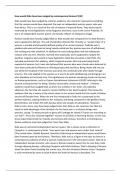How would Dido have been judged by contemporary Romans? [30]
Dido would have been judged by a Roman audience. Her character represents everything
that the romans would have despised. She was an independent warrior queen, who was
from Africa. This is as a result of the role of women in imperial Rome. They were heavily
restricted by moral legislations set by Augustus and more, such as the cult of Pudicitia. As
she is an independent warrior queen, she heavily reflects on Cleopatras image.
Romans would have heavily judged Dido as they would have compared her to how Romans
were supposed to behave. The cult of pudicitia reflected the ‘chastity’ or ‘sexual virtue’ of a
woman, a morally and physically defined quality of an ancient woman. Pudicitia was a
goddess who was portrayed as being heavily veiled and her posture was one of withdrawal,
not inviting any male attention, in addition her eyes looking down and not making eye
contact with any men. Women, married ones especially, were supposed to radiate her
qualities. Augustus also passed a moral legislation called the Lex Juliae in 18/17 BC, this
included punishment for adultery, which targeted women. Not only was being chaste
expected of women, but it was also believed that women who were chaste were believed to
have been particularly effective at offering prayers and sacrifices. Being chaste did not just
last while the husband of the matrona was alive, this continued until after death through
Univera. This only applied to the woman as it was to do with childbearing and bringing in an
alien bloodline to the family tree. The significance of a woman remaining chaste can be seen
on Roman gravestones, such as Corpus Inscriptionum Latinarum 6.26192 referring to the
woman as being known for being “dutiful, honourable, chaste and modest”. A Roman
audience would have judged Dido as when she confides in her sister, she explicitly
addresses the fact that she needs to remain faithful to her dead husband. This shows the
audience that she is aware of the moral values in the ancient world that she needs to follow,
yet she still breaks them. When we are first introduced to Dido she is portrayed as the
perfect matrona, staying faithful to her husband, and being compared to the goddess Diana.
Nevertheless, she breaks this with Aeneas when she accepts his deceptions. However,
Dido's sister, Anna, may have been judged more than Dido as she convinces her that she
needs to take advantage of the situation she has been put in, as Aeneas brings new
warriors, saying “To what pinnacle of glory will Carthage be raised if Trojans are marching at
our side!”. Anna also ‘stitched together’ excuses to aid Dido in deceiving Aeneas. In this way
Anna makes Dido break her chastity and Univera with Aeneas, therefore a contemporary
Roman audience may have judged her more than Dido.
Dido was an unmarried independent warrior queen. She is shown to be a reflection of
Cleopatra. In contemporary Rome “men were men and women were under their control”
(The muted other, Natalie Boymel), therefore Dido being an independent queen would have
been frowned upon by the Romans. Therefore, dido acts as a figure in the epic to show to a
contemporary audience of what a woman could become if she were given power. Dido id an
independent female monarch, who moves a Roman emperor away from his civic duty, Dido
through delaying Aeneas, reflecting Cleopatra with Mark Anhtony. Dido’s delaying of Aeneas
slows him down from founding the roman race, this also threatens Roman virtue. Cleopatra
is only mentioned by name in book 8 when the shield of Aeneas is described. The




